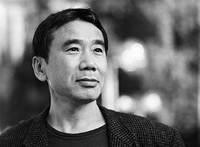
Translators: Philip Gabriel and Jay Rubin
Genre: Short Stories
Date Published: August 29, 2006
Pages: 333
Source: Library
Goodreads Synopsis: Collection of twenty-four stories that generously expresses Murakami’s mastery of the form. From the surreal to the mundane, these stories exhibit his ability to transform the full range of human experience in ways that are instructive, surprising, and relentlessly entertaining. Here are animated crows, a criminal monkey, and an iceman, as well as the dreams that shape us and the things we might wish for. Whether during a chance reunion in Italy, a romantic exile in Greece, a holiday in Hawaii, or in the grip of everyday life, Murakami’s characters confront grievous loss, or sexuality, or the glow of a firefly, or the impossible distances between those who ought to be closest of all.
Buy it here – Amazon India | Amazon US | The Book Depository | Flipkart |
My View: Murakami. *Sigh* Here we go. After two books and two short story books, I am beginning to get Murakami. No no, don’t get me wrong. No one can ‘get’ Murakami (not me, at least). I have even come to doubt if Murakami gets Murakami! What I mean is that I have made my peace with him. So while Kafka on the shore had me pulling my hair (read more about that here) and wanting to hunt Murakami down (which I tried to unsuccessfully, on my trip to Japan), Colorless Tsukuru had me heaving a sigh of relief. Men without women had me rooting for Murakami (more on that here) and recommending the book to each and everyone I knew.
What did Blind Willow and Sleeping Woman do? It made me urge all my bibliophile friends to drop whatever they were reading and begin this with me because I wanted to talk! Which is what you want to do when you are reading a Murakami. It feels better to have some company while hitting your head on the wall. And my precious friends did give me company. Not one, not two but four friends decided to give me company. With one story a day each. 2 stories later, one dropped out. 3 stories later, another one dropped out. 4 stories later, the last two dropped out. *Sigh* It was good while it lasted. We had all these different interpretations going on. It was fun!
But I didn’t give up. That has to be something, right? I persisted. And not with a push or force. It was natural, I wanted to. I decided to take it slow and continue reading one story a day. Giving it time to find its way through the mazes of my mind, set its rhythm with my breath, and settle in somewhere deep within the recesses of my heart. Murakami weaves a net and you fall in, struggling in the beginning but the more you struggle, the more you are tangled up and then eventually you give up, you surrender. And it is then that it hits you. How good it feels not to have to struggle. Just to let go. To be. To savor the breeze in your hair, to let the world pass you by. And you’re there, entangled but content.
I have come to realize interpretation isn’t everything (grapes are sour, eh? 😉 ). Sometimes the story and the writing needs to be savored and inhaled not inspected and analyzed. Murakami is one such author. He pulls you in and doesn’t let you go. No matter if you don’t understand what just happened.
Life happened.
You should read it. Don’t fall into the ‘interpretation’ trap though and you’ll be just fine.
Author Bio:
 Murakami
Murakami
Haruki (Japanese: 村上 春樹) is a popular contemporary Japanese writer and translator. His work has been described as ‘easily accessible, yet profoundly complex’. He can be located on Facebook at: https://www.facebook.com/harukimuraka…
Since childhood, Murakami has been heavily influenced by Western culture, particularly Western music and literature. He grew up reading a range of works by American writers, such as Kurt Vonnegut and Richard Brautigan, and he is often distinguished from other Japanese writers by his Western influences.
Murakami studied drama at Waseda University in Tokyo, where he met his wife, Yoko. His first job was at a record store, which is where one of his main characters, Toru Watanabe in Norwegian Wood, works. Shortly before finishing his studies, Murakami opened the coffeehouse ‘Peter Cat’ which was a jazz bar in the evening in Kokubunji, Tokyo with his wife.
Many of his novels have themes and titles that invoke classical music, such as the three books making up The Wind-Up Bird Chronicle: The Thieving Magpie (after Rossini’s opera), Bird as Prophet (after a piano piece by Robert Schumann usually known in English as The Prophet Bird), and The Bird-Catcher (a character in Mozart’s opera The Magic Flute). Some of his novels take their titles from songs: Dance, Dance, Dance (after The Dells’ song, although it is widely thought it was titled after the Beach Boys tune), Norwegian Wood(after The Beatles’ song) and South of the Border, West of the Sun (the first part being the title of a song by Nat King Cole).




 .
.
I am yet to read a Murakami book, I’ve had Norwegian Wood on my shelf for a while now… ah, but this review makes me want to make a start!
LikeLiked by 1 person
his short stories are a good place to start.
LikeLiked by 1 person
I agree. Try Men without Women.
LikeLike
I’ve heard a lot of good things about his short stories, thank you for the recommendation! 🙂
LikeLiked by 1 person
A criminal monkey? I am curious. Enjoyed the great review.
sherry @ fundinmental
LikeLiked by 1 person
Haha yes. Murakami and intrigue go together. Thank you, Sherry. 🙂
LikeLiked by 1 person